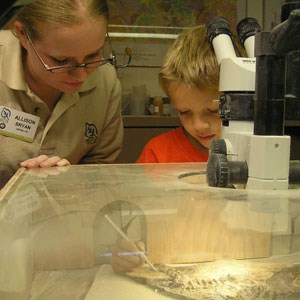
The National Park Service and the American Geosciences Institute host the annual National Fossil Day celebration during Earth Science Week in October. National Fossil Day is a celebration organized to promote public awareness and stewardship of fossils, as well as to foster a greater appreciation of their scientific and educational value. Fossils discovered on the nation's public lands preserve ancient life from all major eras of Earth's history, and from every major group of animal or plant. In the national parks, for example, fossils range from primitive algae found high in the mountains of Glacier National Park, Montana, to the remains of ice-age animals found in caves at Grand Canyon National Park, Arizona. Public lands provide visitors with opportunities to interpret a fossil's ecological context by observing fossils in the same place those animals and plants lived millions of years ago. National Fossil Day is promoted through partnerships with professional organizations, government agencies, and other groups. Representatives from National Earth Science Teachers Association and Paleontological Research Institution assist with planning for National Fossil Day. On National Fossil Day, paleontologists and park rangers share fossil discoveries at special events nationwide and explain the importance of preserving fossils where they are found, so that everyone can share a sense of discovery! Join in the celebration of National Fossil Day today! MISSION: National Fossil Day is a celebration organized by the National Park Service to promote public awareness and stewardship of fossils, as well as to foster a greater appreciation of their scientific and educational values. OBJECTIVES: National Fossil Day events, resources and initiatives will:
|
Last updated: February 6, 2019
